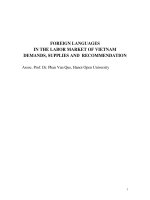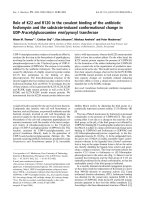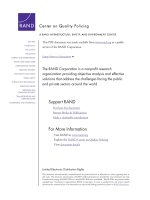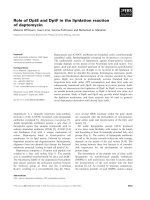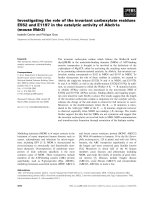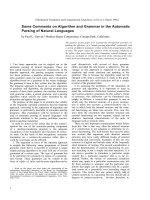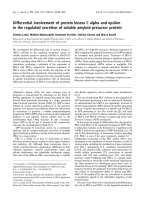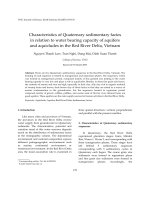PhD Thesis on Public Administration Talent attraction and retention in the administrative agencies of Vietnam
Bạn đang xem bản rút gọn của tài liệu. Xem và tải ngay bản đầy đủ của tài liệu tại đây (495.53 KB, 25 trang )
`ep
MINISTRY OF EDUCATION
AND TRAINING
MINISTRY OF HOME AFFAIRS
NATIONAL ACADEMY OF PUBLIC ADMINISTRATION
TRAN VAN NGOI
TALENT ATTRACTION AND RETENTION IN THE
ADMINISTRATIVE AGENCIES OF VIETNAM
Major: Public Administration
Code: 62 34 82 01
PhD Thesis on Public Administration
Supervisors:
1. Prof. Dr. Nguyen Dang Thanh
2. Dr. Tran Anh Tuan
Hanoi - 2015
0
ABSTRACT
1. Rationale.
“The talented and righteous constitute vitality of a nation. Increasing vitality
makes the nation powerful and prosperous. Decreasing vitality renders the nation weak
and mean. That is why clear-minded sovereigns from one dynasty to another have never
failed to take the training of talents, selection of scholars and nurturing of national vitality
as an urgent undertaking”. (Excerpt from the inscription on the first Doctors’ Stele, 1442
Royal Examination, at the Temple of Literature, Hanoi). Presently, in the era of
knowledge economy and trend of globalization, attraction and utilization of talented
people in the State management activities in general and the operations of the
administrative agencies in particular play a very important role. During the past some
years, the Party and the State of Vietnam have always highly appreciated the importance
of talent attraction and retention, and have issued several policies to attract and retain
talented people, which initially gained some remarkable achievements. However, in
reality, such policies have not been yet desirably effective, or have not identified and
attracted qualified and capable people into the Civil service. At the same time, numbers
of highly qualified and talented cadres and civil servants have increasingly moved to
work for private sectors or non-state sectors becasue of both subjective and objective
reasons, such as: the working environment as well as personnel policies and regimes are
not as attractive; there are shortcomings in personnel recuitment, appointments,
promotion and utilization, etc... With a view to addressing the above mentioned
problems, as well as meeting with the needs of the new situation, it is essential to
undertake a research in a systematic manner on theories and practices of attracting and
retaining talented people in the administrative agencies in Vietnam, and based on the
rersearch results to propose solutions which are appropriate to the real situation of
Vietnam. Therefore, undertaking scientific research on ”attracting and retaining talented
people in the Public administrative agencies in Vietnam” is really necessary and
meaningful at the present time.
1
2. Purposes and missions of research
Purposes of the Thesis is to clarify theories and practices on attracting and
retaining the talented people; propose measures and solutions for attracting and retaining
talented people in the public administrative agencies in Vietnam. To obtain the goal, the
Thesis focuses on several key missions: clarifying theories on attracting and retaining
talents; assessing the current status on attracting and retaining talents in the public
administrative agencies to find out the results, shortcomings and the causes of
weaknesses; and recommending measures and solutions on attracting and retaining the
talented people in the public administrative agencies in Vietnam.
3. Objects and scopes of research
Objects: theories and practices on attracting and retaining talents in the public
administrative agencies in Vietnam.
Scopes: in terms space, administrative agencies of the Government of Vietnam
from central level to local levels; in terms of timing, to study policies on attracting and
retaining talented people which have been issued since 1998
4. Methodologies and approaches
Base on philosophy of Marxism-Leninism, and the thoughts of President Ho Chi
Minh, as well as points of views and directions of the Party and State on attracting and
retaining talents. Utilizing and making a combination of specific research approaches,
such as: desk reviews; social survey by questionnaires; comparative study;
comprehensive and quantity analysis; consulting other relevant study results.
5. Hypothesis
Attracting and retaining talented people in the public administrative agencies is an
important content in human resource management practices in the public sector,
contributing to improve effectiveness and efficiency of the State administrative agencies.
Currently, the policies and the arrangements of policy implementation on attracting and
retaining talented people in the public administrative agencies are not yet appropriate,
2
with number of weaknesses and shortcomings caused by objective and subjective
reasons. The effective attraction and retention of talents in the public administrative
agencies are guaranteed by undertaking synchronously sets of solutions on awareness
improvement,
institutional
improvement,
specific
policies,
implementation
arrangements and essential conditions for successful implementation of the policies.
6. New contributions
The Thesis is a scientific study on theories and practices and is approached
systemically, scientific–based with the aim of clarifying theoretical issues and concepts
of talented people, talented people in the public administrative agencies, factors to
identify talented people in public administrative organizations; concepts and content of
talent attraction and retention; the meaning, the importance and factors influencing talent
attraction and retention, as well as the role of talented people in public administrative
organizations. The Thesis, up on the bases, proposes specific and appropriate solutions
to attract and retain talented people in public administrative organizations, contributing
to establish the Talent Strategy in civil service practices of Vietnam.
7. Meaning of Thesis
The Thesis clarifies and sharpens both theories and practices on talent attraction
and retention in the public administrative agencies. Analysis of current status of
implementing the talent attraction and retention policy in public administrative
organizations are targeted to point out strengths, limitations and inadequacies in policies
and unveil objective and subjective reasons. Outcomes of theoretical and practical
studies are essential in proposing solutions to talent attraction and retention in the public
administrative agencies.
The practical meaning of the system of theories and practices in the Thesis
supports the activities of researching and lecturing the thematic topics on human resource
management in the public sector, regimes of civil service and civil servants which will
be used by various types of learners studying in training institutions nationwide. The
Thesis is also used as a source of references for policy-makers in developing and
3
implementing policies for talented people in public administrative organizations,
contributing to establish the Talent Strategy in the Civil Service of Vietnam.
4
THESIS STRUCTURE
The Thesis is organized into three main chapters excluding introduction, literature
review and conclusion, references and annexes, as follows:
Chapter 1. Theoretical bases on talent attraction and retention in the public
administrative agencies.
Chapter 2. Current status of talent attraction and retention in the Public
administrative agencies.
Chapter 3. Views, measures and solutions to talent attraction and retention in the
administrative agencies.
LITERATURE REVIEW
1. International and national studies relating to the Thesis
Attraction and retention of talents in general and talented people in the Civil
service performed by state administrative organizations in particular have long been the
research topic attracting a variety of national and international individuals and
organizations. These studies were announced in different forms which can be categorized
in three big groups of issues as follows:
1.1. In terms of talents/talented people, role and importance of talents.
1.2. In terms of talent attraction and retention.
1.3. In terms of cadres, civil servants and talent-based management of cadres and
civil servants.
Studying the scientific works of domestic and foreign scholars and researchers on
talents, talent attraction and retention, the author of the Thesis realized that there is a
general coherence through the studies on the role and importance of talent, as well as the
attraction and retention of talented people, considering talents as key factor for ensuring
the development of a nation. Also, the Ho Chi Minh ‘s ideology about talent was
thoroughly explored, analyzed and applied in a plenty of works. Many studies stated
5
lessons learned from experience from history of Vietnam and of foreign countries in
regards of talent attraction and retention. Almost studies reached an agreement that the
current status of talent attraction and retention in general, and talent attraction and
retention in public sector remains inadequacy and limitations in both institutions, policies
and in practical implementation arrangements. Specific solutions were recommended in
some research works regarding talent attraction and retention in the public administrative
organizations.
2. Some remarks and to-be-studied issues.
Firstly, majority of studies were limited in confirming the role and importance of
talents in general for the course of building and development of the country. Not many
in-depth studies on talented people, talent attraction and retention in public
administrative organizations existed.
Secondly, evaluations of current status in talent identification and retention in State
administrative organizations are normally conducted on the basis of information sources
from mass media, internet, and theoretical studies and basically limited in qualitative
judgement with weak supports of insufficient data source. There existed not many
studies, which officially and comprehensively assessed on the current status of talent
attraction and retention in the Public administrative organizations of Vietnam.
Thirdly, certain studies embedded specific proposals and solutions to improve
efficiency in talent attraction and retention. Nevertheless, they still remained scattered,
heavily qualitative and not truly ensure systematic feature of comprehensive solutions
from the stages of awareness, development and issuance of policies and regulations to
the stages of implementation arrangements and resources.
As rationalized, the Dotoral candidate chose the topic “Talent attraction and
retention in the public administrative agencies of Vietnam” to study in this Doctoral
Thesis.
6
CHAPTER 1
THEORETICAL BASES ON TALENT ATTRACTION AND RETENTION IN
THE PUBLIC ADMINISTRATIVE AGENCIES
1.1. Talented people, talent attraction and retention in the public
administrative agencies.
1.1.1. Basic concepts.
- Talented people are outstanding qualified and competent people with particularly
outstanding performance and affecting social general improvements and development.
Talented people are the ones who have the qualifications, outstanding capacity, with
particularly outstanding performance and affect the progress and development of society.
Talent, if formed and developed on a foundation of good moral qualities, honesty, and
kindness, responsibility, tolerance, diligence and efforts..., will bring about significant
improvements and development for the whole society, effectively serving communities.
- Talented people in Public administrative organizations shall be construed as
people who are outstandingly qualified and competent, the ones who always successfully
completed tasks according to their duties, and giving results, achievements influencing
on the development of a certain sector or a particular field in operation of a state
administrative organization. Talent must always incorporate morality, and talent and
morality must be mutual basis, conditions and premise to promote each other to perfect
personality of talented people in the state administrative organizations.
- To identify meritocratic people regarding both 'morality' and 'talent' requires a
system with specific factors to assess, identify talented people, namely: intellectual
competence; practical competence and must base on moral qualities. For talented people
in Public administrative organizations, in addition to the above factors, the Thesis
assured the need of the element of job performance in civil service activities.
- Stemming from the nature and characteristics of the Public administrative
organizations as well as the characteristics and nature of the work of civil servants, it
7
may determine that the administration system does need people having true talent to take
charge of the following groups of duties: leadership and management, and policy making
advice. Thus, the Thesis has conducted classification and provided specific criteria for
the leadership and managerial talents and policy-making advice talents.
1.1.2. Talent attraction and retention in the public administrative agencies.
- Attracting talented people in the public administrative organizations is to create
attractive and motivating incentives through comprehensive mechanisms and policies on
management and development of human resources in the public administration system
in order to create favourable conditions in all aspects (both physical and mental
conditions) for those with talent, outstanding competence, high qualifications and good
conducts to work for the Public administrative organizations. Talent attraction in the
public administration organizations is done by attracting from internal and external
sources through strict, scientific and highly competitive recruitments.
- Talent retention in administrative system can be construed as the trust and
assigning the talented people important jobs and positions, which are worthy and match
their competence and forte, while creating favourable conditions for talented people to
develop their abilities to outstandingly complete the assigned tasks and treat them
adequately with their merits and contributions to the general work of the public
administrative organizations.
Talent attraction and retention in the public administrative agencies have close and
interactive relations. Well performing retention policies will serve as an impetus for
attracting talented people, and vice versa, performing good attraction practices will
create essential premise for deploying talent retention policies for talented people in the
public administrative organizations.
1.1.3. Necessity of talent attraction and retention in the public administrative
agencies.
8
- Talent attraction and retention always play important roles in the course of
country construction, protection and revival over different periods of time. Talented
people are considered as national assets.
- Any aspects of social life in general and those in the operation of state
administration in particular need talented people. It is obvious requirements of
administration management, for its role, importance and complexity, to attract and recruit
talented people to work in the administration system.
- Nowadays, talent attraction and retention becomes especially important as
Vietnam is in the process of building and developing the socialist market oriented
economy.
- It is crucial to carry out talent attraction and retention as Vietnam, at present, has
been in the process of building and perfecting the State with rule-of-law of the people,
by the people and for the people under the leadership Vietnamese Communist Party. The
efficient and effective management and administration of the State, the ensured status of
socialist legislation and disciplines, and the protection of legitimate rights and interests
of people vastly vested in the quality of cadres and civil servants.
-The context of globalization and international integration is growing embedded
both positive and negative impacts, sophisticatedly mixing with opportunities and
challenges. Therefore, it is needed to attract qualified, competent with thorough
knowledge of international legislation people and concurrently, the ones who can master
firmly new modern working skills.
1.2. Factors influencing talent attraction and retention.
Talent attraction and retention policies in the public administrative organizations
are affected and driven by many factors. Having proper and full awareness and
understanding on the influences of these factors for attracting and retaining talents in
the public administrative agencies will be esentially important for the identification of
measures and methods of attracting and retaining talented people. Driven factors may
be categorized into two groups, which are: objective factors and subjective factors.
9
2.2.1. Objective factors.
In any field of social life, the objective factors are expressed as the processes and
factors that are independent from the wills and desire of the people. Therefore, in the
process of developing and implementing policies in general and talent attraction and
retention policies in the public administrative agencies in particular, it needs to consider
the following objective factors, which are: context of economic development; sociopolitical context; socio-cultural typical traits; education; the development of science and
technology; innovation in role, functions and smart downsizing of the state apparatus.
1.2.2. Subjective factors.
Talent attraction and retention are not scattered and single actions, in contrast, it
involves the whole cycle of human resource management. In order to develop talent
attraction and retention policies for the public administrative organization, it necessarily
pays special attentions to 02 groups of factors, which positively impact and determine
the talent attraction and retention practices, which are: (1) human resource - related
factors, including: people - organization
fit, and people - job fit, remuneration,
rewarding, honouring, training and career development, and opportunities to perform
challenging and complicated tasks; and (2) organizational factors such as competence,
leadership and managerial behaviours of the leader; culture, structure and policies of the
organization; effective communication; tight relationship with colleagues; working
environment and life-work balance; capacity of human resource management
organizations.
1.3. National and international experiences in talent attraction and retention.
1.3.1. Experience in talent attraction and retention in Vietnam history.
In the history of the nation, our antecedent generations had a lot of experiences in
talent detection and retention, considering the talented and righteous constitutes vitality
of a nation. The tradition of upholding the talented and righteous people are inherited
and promoted through many historical periods, and was consistently implemented in the
country administration and ruling citizens policies through various feudal dynasties, and
10
is regarded as one of the behaviour criteria of smart kings, concurrently, the beauty in
the village community life, and of every family and clans.
In terms of talent attraction: Obviously, the talented and righteous is always the
motto and also one of the top principles for ruling country used in many of feudal
dynasties. Starting from the Ly dynasty, the use of the elite (Confucian intellectual elite)
directly in management apparatus was viewed as a principle and carried out through civil
service examination form, then the practice was further institutionalized to fairly
completed status in the Le dynasty. In addition to civil service examination form,
nomination form is one of the measures used by feudal dynasties in Vietnam to select
employees with quite strict statutes. Besides, self-nomination was another form
frequently used, in which the nominators were often the talented and brave people;
sometimes, in order to prove themselves, they have to demonstrate their high talents and
strong wills by extraordinary actions to convince other people to use them in a worthy
way.
In terms of talent retention: Talent retention and treatment were performed in
many different forms i.e., those who won prizes in civil service examinations were
appointed to relevant position suitable to their competence and forte (post appointment
mechanism), or were granted bonuses and rewards (money, garden, rice fields, lands,
houses, etc...). The winners in examination got honoured in a series of solemn
ceremonies, and they especially got their names engraved on the gravestone for latter
generations’ notice. After certain a period of work performance, the Royal Government
routinely held “follow-up tests” to foster more knowledge and develop appropriate
policies; and allocated bonuses and rewards in accordance with ranks and merits.
Together with the “follow-up tests”, several feudal dynasties, basing on the tests, applied
strict and transparent rewarding and disciplines regimes.
Inheriting and developing the talent retention tradition of our antecedent
generations in the history, the Party and State of Vietnam always give special attentions
to the attraction and retention of talented people, and a plenty of guiding principles and
polices have been promulgated that demonstrates in respects of the role of talent across
11
fields, upholding innovative capacity and enormous contributions of talent for the
country. This is evidently shown through the valuable lessons in talent attraction and
retention of the President Ho Chi Minh, and the Party’s viewpoints and policies in talent
attraction and retention.
Generally, various methods had been brought to apply by our our antecedent
generations to attract and retain talented and righteous people for building and protecting
the country in different periods of time for different objects; nevertheless, taken all
together, at all times in Vietnam history, talent attraction and retention have concerned
issues, such as: where to find the talents and how to attract them; how to use talented
people, which position to arrange them into appropriately; how to protect talented
people, and have mechanisms to nurture, develop, honour and treat talented people with
respect, meanwhile, to apply strict and transparent sanctions rewarding and disciplines.
1.3.2. International experiences in talent attraction and retention.
The development, training, fostering and using talented people play extremely
important role in socio-economic development and become strategies in most countries
around the world. Approaches vary in different countries regarding talent attraction,
exploration and retention; however, the ultimate purpose still stays in how to have the
contingent of genuine talented people with professional ethics working in government
organizations. Within the scope of this study, the Doctoral candidate selected seven
developed countries, with modern administrative system, which are: the United States,
France, Germany, Japan, South Korea, China and Singapore. Additionally, the candidate
also study and learn the related experiences used by other countries in the world,
especially those are members of the Organization for Economic Cooperation
Development (OECD) to attract and retain their talented people in civil service.
In terms of attraction: Countries are interested in recruiting outstanding students
from the universities; they use highly competitive entrance exams to train them into
leaders; develop strategies to foster and educate potential talent; and establish talent
recruitment committees.
12
In terms of retention: The major forms of talent retention are being used including
talent protection; training and career development; circulate potential talented people to
timely grasp opportunities practically; apply appropriate remuneration regime and
adequate treatment polices; and arrange talented people into leadership positions which
match their qualifications and capabilities. Some countries established leadership
training funds.
1.3.3. Lessons learned from experiences for Vietnam.
Studying experience in talent attraction and retention in Vietnam history and
several countries in the world helps draw some lessons for referencing in the process of
developing policies to attract and retain talented people in administration system as
follows:
Firstly, talent identification, attraction and respected treatment are emphasized and
upheld.
Secondly, human resource planning in order to secure the continuity of generations
of talented senior leadership has always been considered an important factor in human
resources management and development.
Thirdly, recruitment has always been paid special attention. To be considered as a
talented civil servant and be probably promoted or appointed to key leadership positions,
candidate must undergo a rigorous selection and highly competitive process.
Fourthly, career development path of civil servants, who are considered talented
people, depends on qualification, competence and working performance.
Next, during the course of working, in order to be leading and managerial civil
servants, the civil servants must be experienced through different working positions in
different organizations, even in different levels of governments.
In addition, the development process of talented civil servants must undergo
various stages, from selection to training, fostering and using, through which talent is
under scrutinized, and developed in conditions of nurturing and assisting synchronously
by family, schools, state and society from local to national levels.
13
Moreover, training and fostering must be associated with the appointment and
utilization; those successfully completed the required training courses with excellent
results must be well treated and retained. The highly qualified programs for talent
training are often conducted widely and effectively at prestigious and reputed training
institutions and universities.
The next point is, sending students and talented staff to study in advanced
countries and strengthening cooperation with prestigious training institutions worldwide
to organize training courses domestically with international standards is, in fact, the
prerequisite in talent developing process.
Finally, talent attraction and retention policies should be extraordinary.
CHAPTER 2
CURRENT STATUS OF TALENT ATTRACTION AND RETENTION IN THE
ADMINISTRATIVE AGENCIES OF VIETNAM
2.1. Overview of the civil servant contingent and civil servant management in
the Public administrative organizations.
2.1.1. Civil servants in the Public administrative organizations.
The formation and development of cadres and civil servants in our country have
always been associated with the formation and development of the new State and the
renovation and development of the country. Cadres and civil servants always play a
key role in the political system, contributing to bring the Party’s direction and State’s
legislation into daily life. According statistical data provided by the Ministry of Home
Affairs in 2012, there are 270.262 civil servants in state administrative organizations
from the district level up to the central level (accounting for 70.4% of the overall
number of civil servants across the country).
2.1.2. Civil servant management practices in Public administrative organizations.
14
Since its establishment, the civil service system in Vietnam has been, so far,
passing through a plenty of renovations along with requirements of revolutionary stages.
The contents of reforms are not only appropriate to Vietnam political regimes but also
suitable with the development trends of the civil service systems in the world. Institutions
and policies on civil service and civil servants have been sufficiently issued relatively.
The development and quality improvement of cadres and civil servants have been made
with different solutions i.e., competitive examinations for recruitment and grade
promotion; smart right-sizing; appointments and re-appointment for certain terms,
dismissal, applying the principles of recruiting and appointing the right people in the
right positions the the civil service. Civil servant management system has been
developed and organized from the central to local levels in which consistency is ensured.
Public offices have been built, well equipped and gradually modernized to create
favourable conditions for cadres and civil servants in performing their work.
Despite such achievements, the current civil service regime remains shortcomings
and limitations which need to be addressed, such as: system of civil service institutions
are insufficient and inconsistent; staff-size indicative norms management is still imposed
by “begging and giving” mode; recruitment is basically certificate-based with less focus
on competency in civil service implementation; adjustment and completions of rankbased and position-based title standards for leading and managerial civil servants are
slowly performed; limited quality in civil servant recruitment and grade promotion
examinations; reporting and statistical system are not adequately performed and put in
order; database on cadres and civil servants management system is not yet in-placed and
maintained.
2.2. Current status of talent attraction and retention in the public
administrative organizations.
2.2.1. Current regulations on talent attraction and retention in the public
administrative organizations.
15
Over the years, the State has issued a plenty of legal documents on cadre and civil
servant management, including regulations of implementation of talent attraction and
retention policies in public administrative organizations, initially creating a legal basis
for these policies to be implemented in practice. The regulations include the
implementation of policies for talented people, provisions of regulations and policies
related to talent identification, selection, nomination, training, uses and treatment in civil
service activities. So far, a number of ministries, Government agencies and localities
have already, on the base of their specific conditions, actively promulgated regulations
about attraction and favouring highly qualified and competent people. The regulations
mainly focus on issues in priority, such as recruitment, encouraging cadres and civil
servants to participate in training and fostering activities, or utilizing material rewards to
ensure the whole devotion and engagement of cadres and civil servants.
However, talent attraction and retention policies remain certain concerning issues,
i.e., there are no statutory documents stipulating in detail and guiding the
implementation; practical implementation are asynchronous and vested in the conditions
and capacities of every ministry, sector and locality. New promulgated rule are rather
prescriptive and scattered out in various legal documents generally guiding cadre and
civil servant management, certain inappropriateness still stays in regulations regarding
priorities and incentives for highly qualified and competent people (basically certificatebased). Meanwhile, many other important issues, such as post-attracted uses of talent
people, working environment, promotion and treatment policies, have not been
institutionalized. Besides, concepts of talent and talented people in civil service activities
are not coherently existed; no distinction between professional talents and
managerial/leadership talents; no clear separation between recruiting highly qualified
people and attracting genuine talented people. A lot of factors to determine talented
people, such as, intellectual competence, executive competent and morality, have not yet
put into specific regulations. Besides, roles and responsibilities of heads of agencies and
units in talent detection, attraction, training, employment and treatment have not yet been
16
enhanced; there are no nomination mechanism in-placed causing difficulties and
limitations in talent detection in civil service.
2.2.2. The implementation status of talent attraction and retention in the Public
administrative organizations.
- Achievements
In terms of talent attraction. State organizations at Central and local levels have
promulgated and executed talent attraction, retention policies. The main points focused
in these policies are the implementation of priorities in recruitment and treatment
regimens for cadres and civil servants who are competent, qualified and make
achievements and contributions to their organization or unit. Consequently, a number of
ministries, sectors and localities have recruited the valedictorian graduated from
universities and attracted masters, doctors, associate professors and professors into their
organizations.
In terms of talent retention. Talent treatment, promotion and retention policies
have been implemented in various ministries, sectors and localities applied to cadres and
civil servants who are highly qualified and attaining achievements. Generally, people
attracted by ministries, sectors and localities are arranged in appropriate position that
promoting their academic background, favouring their competences and forte; offering
opportunities to follow upgrading studies in accordance with the professional knowledge
and skills, especially in post-education. Concurrently, ministries, sectors and localities
have spent certain material rewards for cadres and civil servants to engage them with
their job.
- Obstacles and limitations.
In terms of talent attraction. Talent attraction policies have not been studied in a
truly scientific manner and appropriate to each sector and professions in organizations
and units; hence, lacking of focal points and wide-spread cause difficulties in the
arrangement; there is almost no consistency between sectors, fields and among localities.
The number of people employed under a talent attraction and retention policies remains
17
very limited. Part of talented people attracted to work in state administrative
organizations have not revealed their full potentials to serve the work of agencies and
units.
In terms of talent retention. The implementation of talent retention for civil
servants performed in ministries, sectors and localities merely emphasizes on training
and retraining for improving the quality of their available human resources. In the
meanwhile, a lot of the contents in retention policies, i.e., working environment, wage
policy, promotion opportunities, etc., were not well performed, that attributed to the
resignation of talented people, who got recruited, after short time of working due to many
different specific reasons.
The causes of those limitations in implementing talent attraction and retention
policies in state administrative organizations are: there is no unified perception of talent,
criteria for identifying talented people, and to accurate evaluation of position and roles
of talented people in relationship with effectiveness of state administrative organizations;
there is no national strategy on talented civil servants in-placed, therefore, disparities
exist between national policies with typical local and regional policies. Resources
including human resources, material and financial resources are limited. Slow progress
in reforming in cadre and civil servant management from such stages as recruitment,
grade promotion, evaluation, rewarding, disciplines, remuneration, treatment, ect…
became obstacles to the implementation of talent policies. In the context of vigorous
competition in attaining highly qualified personnel, the public sector is not yet attractive
enough for those having talented to make their choice to work for.
2.3. Several concerned issues on talent attraction and retention in the public
administration organizations.
Firstly, to raise awareness about the position, role and importance of talented
people, and about the need for implementation of talent attraction and retention policies
in state administrative bodies.
18
Secondly, to ensure consistency in implementing talent detection, fostering, and
retention and treatment policies in the civil service. Develop a National Talent Strategy,
based on which the ministries, sectors and localities, depending on their actual
conditions, can apply and consistently implement.
Thirdly, to perfect institutions for cadres and civil servants; well perform of
recruitment, using, evaluation, rewarding, disciplines, remuneration and treatment
policies, etc… for cadres and civil servants.
Fourthly, to promulgate specific mechanism on the practices of organization and
personnel management, i.e., complete organizational structure of organizations to assist
the Government to administer the staff of cadres and civil servants and the system of
bodies performing organization and personnel management in ministries, sectors and
localities. Further uphold the role, responsibilities of the leaders of organizations and
units in recruitment and retention of cadres and civil servants.
Next, talent attraction and retention policies need to be done synchronously with
the economic, educational, cultural and social policies.
In addition, to promote the role and responsibilities of the Party’s Executive
Committees, the socio-political organizations to involve them into talent diction,
nomination, fostering and honouring for state administrative organizations.
Last but not least, to build encouraging policies to promote qualified cadres and
civil servants to come to work in remote provinces and ethnic minority areas. Develop
policies to support the talent development for ethnic children and local people to serve
the local socio-economic development.
19
CHAPTER 3
VIEWS, SOLUTIONS TO ATTRACT AND RETAIN TALENT IN STATE
ADMINISTRATIVE AGENCIES
3.1. Views of attracting and retaining talent in State administrative agencies.
Firstly, it is to fully and thoroughly grasp the Party’s guiding principles and
policies in attracting and retaining talented people in the strengthened industrialization
and modernization era of the country.
Secondly, building and perfecting the policies in attracting and retaining talented
people in State administrative agencies must be conducted synchronously with
renovating management of cadres, civil servants aiming towards renewing and
improving quality of cadres, civil servants and public employees.
Thirdly, talent attraction and retention in State administrative agencies should
necessarily be stemmed right from characteristics and typical features of civil service
execution of cadres and civil servants.
Fourthly, the implementation of policies in talent attraction and retention in State
administrative organizations should be done synchronously with the development of
highly qualified social workforces.
3.2. Solutions to talent attraction and retaining in State administrative
agencies.
3.2.1. Solution cluster on awareness of talent attraction and retention in state
administrative organizations.
Firstly, coherent awareness should be ensured on concepts and factors identifying
talented people in state administrative organizations. Once achieved unified and coherent
awareness, talent detection factors could be developed across aspects, i.e., qualification,
competencies (intellectual competencies and practical competencies); performance
outputs; ethical quality; ability to gather and unify community.
20
Secondly, clear understandings of necessity and importance of talent attraction and
retaining in State administrative agencies.
Thirdly, it is not only the responsibility of the Party’s organizations and State
agencies but also the duties of the whole society to build a clarified mindset of talent
attraction.
3.2.2. Solution cluster on policies in talent attraction and retaining in State
administrative agencies.
The first thing is to urgently conduct researching activities to build and promulgate
National Strategy on Talent.
Secondly, Government should consider promulgating Decree(s) on identifying,
fostering, retaining and treatments to talented people in civil service execution.
The third thing is to perfect the managerial institutions for cadres, civil servants
towards the trend of attracting and retaining talented people for State administrative
organizations.
3.2.3. Specific solution cluster on talent attraction and retaining in State
administrative agencies.
At first, policies on remuneration and treatment regimes for talented people need
be well implemented.
Secondly, complete and well implement honouring and rewarding policies.
Develop necessarily polices to honouring the career and fame of civil servants.
Thirdly, about training and fostering and promotion opportunities. Develop
programs and methods of training and fostering the one identified as talented people in
civil service. Implement training and fostering in forms of planned circulation, transfers
and secondment.
Fifthly, on recruitment. Expand the channels for attracting people having
excellent academic achievements, the top candidates having highest scores in entrance
examinations and talented people working in other sectors into administration system.
21
Bring to apply forms of referral, nomination and self-nomination; introduce talented
people to competent authorities to arrange and use of talented people. Renovate the
selection method applied to leading and managerial civil servants. Renew forms and
contents of civil service recruitment examinations.
The sixth point is that the use of talented people must base on advantages in term
of personal traits, forte and gifted abilities of civil servants to arrange position
appropriately. Pay attention to differences in trends of talent, intellectual competency
level, personal morality and physical factors … in arranging positions for talented people.
Make clear identifications between consultative and policy-making talent with leading
and managerial talent. Renovate concepts on the use of talented people.
Last but not least, innovate annual evaluation of civil servant in engagement with
performance, outputs and efficiencies in civil service; highlight the evaluation
responsibilities of the people assigned with authorities to use and manage civil servants.
3.2.4. Solution cluster on conditions ensuring the implementation of talent
attraction and retention.
Firstly, about organizational apparatus. There need an advisory organization to
help the Government implement state management on policies for talented people in civil
service activities. Strengthen the organizations responsible for organization and
personnel management in ministries, central directly controlled provinces and cities.
Secondly, about the human conditions. Arrange qualified and competent people,
who are experienced, good ethics, passionate, enthusiastic, to work in organization and
personnel management units.
Thirdly, promote personal responsibility of heads of organizations and units in
operating talent attraction and retention.
Finally, build appropriate and specific financial mechanism and policies in order
to mobilize more financial resources to serve the implementation of policies for talented
people in civil public service activities.
22
CONCLUSION
Nowadays, in the era of intellectual economy and globalization trends, talent
attraction and retention into administration system becomes increasingly important to
contribute to reforms and improving the quality of cadres and civil servants in the
direction of being professional and modern, meeting the requirements of public
administration reforms. Therefore, it needs to build and perfect talent detection,
attraction, training, retention and reasonable treatment mechanisms in civil service.
The Thesis focused to answer the big questions posed, which are:
Firstly, to clarify the theoretical issues on perception of talented people in state
administrative organizations. Study and learn how to detect talented people in state
management practices in Vietnam at present. Then propose specific solutions to talent
identification in administration system.
Secondly, the Thesis analyzes factors affecting talent attraction and retention in
state administrative organizations, including objective factors and subjective factors,
considering them important factors imposing great impacts on the effectiveness in talent
attraction and retention in state administrative organizations, and using them as key bases
for assessing the current situation and recommend solutions.
Thirdly, to clarify the theoretical issues on talent attraction and retention in state
administrative organizations. Assess the current situation of talent attraction and
retention in state administrative organizations in ministries, sectors and localities. Point
out the achievements as well as shortcomings and limitations, and the causes of these
limitations.
From assessing the current situation of talent attraction and retention in state
administrative organizations, the Thesis proposes perspectives, principles and
synchronous implementation of concrete solution clusters aiming at efficient attraction
and retention of talented people.
23
However, attract and retain talented people into the state administrative
organizations is a big, sophisticated issue concerning many theoretical and practical
issues to be further clarified in the coming time so as to formulate premises for perfecting
the system of policies in talent attraction and retention in state administrative
organizations in response to requirements of the new situations./.
24
